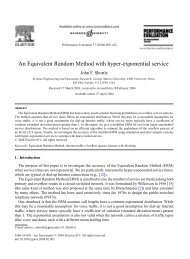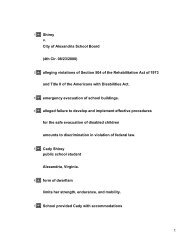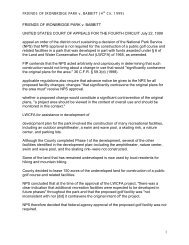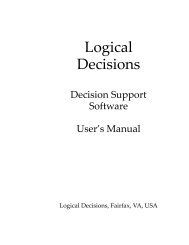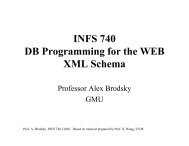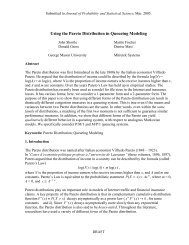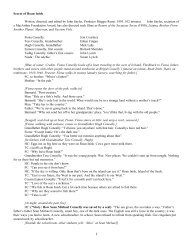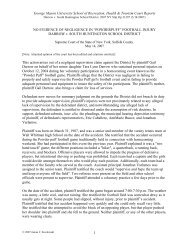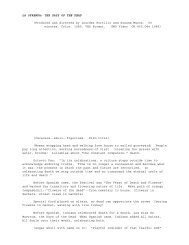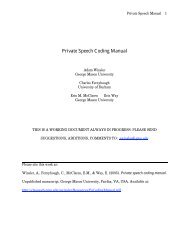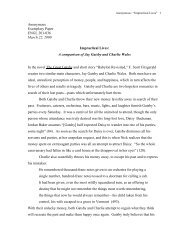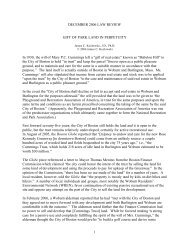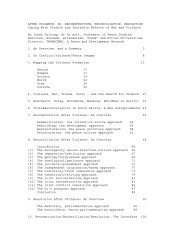Naturist Society Inc. v. Fillyaw, 858 F.Supp. 1559 - Classweb
Naturist Society Inc. v. Fillyaw, 858 F.Supp. 1559 - Classweb
Naturist Society Inc. v. Fillyaw, 858 F.Supp. 1559 - Classweb
You also want an ePaper? Increase the reach of your titles
YUMPU automatically turns print PDFs into web optimized ePapers that Google loves.
That the defendant's acts were "within the scope of his discretionary authority" is not<br />
disputed. With regard to the second requirement, the plaintiff has not shown that defendant<br />
<strong>Fillyaw</strong>'s actions "violated clearly established law." In this case, applicable law was certainly not<br />
well settled to the degree that defendant <strong>Fillyaw</strong> should have reasonably known that his actions<br />
would violate the plaintiffs' rights.<br />
First Amendment cases generally involve a delicate balancing of the government's interests<br />
against the rights of the individual, the resolution of which is often fact specific and not<br />
foreseeable. That there existed a significant degree of uncertainty with regard to applicable law<br />
cannot be denied in this case. This uncertainty is manifested by the procedural history of the<br />
case: this Court's original opinion, followed by the Eleventh Circuit's affirmance in its initial<br />
opinion, and then its reversal upon rehearing. A public official certainly cannot be expected to be<br />
more knowledgeable than the courts with regard to the complexities of constitutional law.<br />
Moreover, the Court finds that <strong>Fillyaw</strong> acted reasonably in light of the state of the law. He<br />
promptly granted the plaintiffs a permit to demonstrate in a central location of the park during<br />
peak visiting hours.<br />
Accordingly, the Court concludes that defendant <strong>Fillyaw</strong> is entitled to qualified immunity<br />
with respect to the claims against him in his individual capacity. Therefore, defendant <strong>Fillyaw</strong> is<br />
immune from liability under Counts I and III of the plaintiff's second amended complaint, to the<br />
extent that he was being sued as an individual for an award of damages.<br />
For the reasons stated above, the Court finds that there are no genuine issues of material fact<br />
outstanding, and disposition by summary judgment is appropriate. Accordingly, having reviewed<br />
the motion and the record, and being otherwise duly advised, it is hereby:<br />
ORDERED and ADJUDGED as follows:<br />
(1) The plaintiffs' Second Motion for Summary Judgment is GRANTED in part and<br />
DENIED in part. As to Counts I, II, and III of the second amended complaint, summary<br />
judgment is hereby GRANTED against defendant <strong>Fillyaw</strong> in his official capacity, and in favor of<br />
the plaintiffs. The Court finds that former and amended Rule 16D-2.007(1) of the Florida<br />
Administrative Code is unconstitutional on its face. The Court further finds that former Rule<br />
16D-2.008 of the Florida Administrative Code is unconstitutional on its face and as applied to<br />
the plaintiffs in this case.<br />
(2) The defendant's Second Motion for Summary Judgment is GRANTED in part and<br />
DENIED in part. Summary judgment is hereby GRANTED against the plaintiffs, and in favor of<br />
defendant <strong>Fillyaw</strong> in his individual capacity, as to all counts of the plaintiffs' second amended<br />
complaint. Further, summary judgment is GRANTED against the plaintiffs, and in favor of<br />
defendant <strong>Fillyaw</strong> in his official capacity, as to Count IV of the plaintiffs' second amended<br />
complaint.<br />
(3) The plaintiffs shall file a proposed form of judgment for entry in this cause within<br />
fifteen (15) days from the date of this Order.



